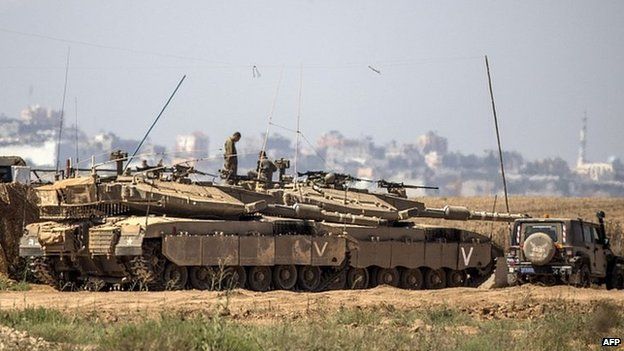Hamas 'ready for Gaza ceasefire' if Israeli raids stop
- Published

Hamas has offered to halt its rocket attacks if Israel stops its air raids on the Gaza Strip, the BBC understands.
A source with the Palestinian militant group said Egyptian intelligence officials had brokered a potential ceasefire, after escalating clashes.
Israel says sporadic shelling from Gaza has continued. Several rockets and mortars landed without causing harm.
There is high tension in East Jerusalem ahead of the planned funeral of a murdered Palestinian teenager.
There have already been two days of clashes there between masked Palestinians and Israeli police over the kidnap and murder of 17-year-old Mohammed Abu Khdair.
The motive for his killing has not been confirmed but there are claims it was an act of revenge for the recent murders of three Israeli teenagers in the occupied West Bank. Israeli police are investigating.
The teenager's funeral has already been delayed, adding to the tension.
Police say they will hand the body to the family after Friday prayers, which are likely to end at about 12:30 local time (09:30 GMT).
In the past few weeks dozens of rockets have been fired at Israel from Gaza and Israel has carried out multiple air strikes on what it says are rocket-launching squads and militant facilities.
On Friday four rockets were fired from Gaza, the Israeli army said. One was intercepted by the Iron Dome air defence system and at least two hit open ground. Later two mortar shells also landed in open fields.
Israel then fired artillery shells into southern Gaza. There were no reports of injuries on either side.
A Hamas source told the BBC that "intensive contacts" between the group and Egyptian officials "succeeded in reaching a new truce between Hamas and Israel, and that the ceasefire agreement was to be announced within hours".
The source said Hamas was ready to halt rocket fire in return for an assurance that Israeli would stop air raids.
A senior Israeli security official told the BBC that "the ball is in Hamas' court.
"We informed Hamas that calm will be answered with calm, and if it is not calm, they will be hit hard. The message is very clear and was delivered in a very clear manner. If they took upon themselves a unilateral ceasefire and it is calm, so be it," the official said.
Kevin Connolly, Middle East Correspondent, Jerusalem
Egyptian military intelligence often provides a channel of communication between Israel and Hamas at moments of crisis.
Hamas officials now say those contacts have paved the way for a truce which has the potential to lower the political temperature after a week of sharply escalating tensions.
Hamas, as an offshoot of the Muslim Brotherhood movement, has been badly weakened by the Egyptian military government's moves to crush the brotherhood at home and can't afford a sustained escalation.
Israel argues it only launches air raids against Gaza in response to rocket fire.
The announcement may help to calm the mood ahead of the funeral in Arab East Jerusalem of Mohammed Abu Khdair, the Palestinian teenager who was abducted and murdered earlier in the week.
That service though remains a potential flashpoint and as the hour of Friday prayers approaches Israeli police will be out in force near the entrance to the Al Aqsa Mosque in Jerusalem's Old City, limiting access to women and to men over 50, to limit the potential for disorder.
The BBC's Rushdi Abualouf in Gaza City says contacts between Hamas and Egypt appeared to have calmed the situation on the ground.
Earlier, Israel deployed extra forces along the border with the Gaza Strip after several barrages of rockets struck targets in southern Israel. A military spokesman said they were taking up "defensive positions" in Israeli villages that had been hit by rockets.
Prime Minister Benjamin Netanyahu said Israel would only act against further rocket attacks.
On Thursday, 10 Palestinians were injured in an Israeli air strike on Gaza. Air raid sirens sounded in communities across the south of Israel and a soldier was reported to have been slightly injured by a rocket strike in Eshkol.
Tensions have been high in East Jerusalem ahead of Mohammed Abu Khdair's funeral.
The teenager was seen being forced into a car in Shufat, East Jerusalem, early on Wednesday and his body was later found in West Jerusalem.
It comes after the bodies of the three Israeli seminary students were found near the city of Hebron on Monday, two-and-a-half weeks after they were abducted. Their funerals took place on Tuesday.
Mr Netanyahu blamed their deaths on Hamas and called on Palestinian President Mahmoud Abbas to abandon a partnership his Fatah movement had struck with the group. Hamas has denied any involvement in the murders.
Israel-Gaza tensions
- 2005: Israel pulls settlers and troops out of Gaza, which it had occupied since 1967. Palestinian Authority assumes administrative control. Israel still controls Gaza's airspace and seafront
- Gaza rocket attacks and Israeli air strikes continue
- Jan 2006: Hamas wins Palestinian elections, heads unity government; Israel imposes economic sanctions on Palestinian Authority
- June 2006: Hamas kidnaps Israeli soldier Gilad Shalit in cross-border raid (Shalit is released in 2011 in exchange for hundreds of prisoners) - Israel launches first ground invasion of Gaza since its withdrawal
- Nov 2006: Gaza ceasefire declared
- Jun 2007: Hamas ousts rival Fatah from Gaza Strip; Israel intensifies restrictions on Gaza, in what becomes known as its blockade
- Feb-March 2008: Israeli three-day operation in Gaza to stop rocket fire
- Dec 2008-Jan 2009: Three-week conflict between Gaza militants and Israel
- Nov 2012: Eight-day Israeli offensive against Gaza to stop rocket fire; ends with ceasefire
- Sporadic rocket fire and air strikes continue, intensifying in June 2014.